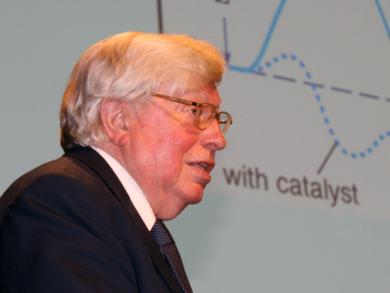Professor Emeritus Gerhard Ertl, Fritz Haber Institute of the Max Planck Society, Berlin, Germany, celebrates his 80th birthday on October 10, 2016.
Ertl’s research interests focus on surface chemistry. He received the Nobel Prize in Chemistry in 2007 for his studies of chemical processes on solid surfaces. His work has helped to explain how heterogeneous catalysts work in applications such as the Haber-Bosch process, which is of great industrial importance, or catalytic converters, which remove harmful compounds from car exhaust.
Gerhard Ertl studied physics at the Technical University of Stuttgart, Germany. He received his Ph.D. from the Technical University of Munich, Germany, in 1965. He joined the Technical University, Hannover, Germany, as Professor of Physical Chemistry in 1968 and moved to the Ludwig Maximilians University, Munich, in 1973. From 1986, Ertl was Director at the Fritz Haber Institute of the Max Planck Society, Berlin, Germany, where he remained until his retirement in 2004.
In addition to the Nobel Prize and a large number of other honors, Professor Ertl has received the Nicolaus Copernicus Medal from the Polish Academy of Sciences in 2008, the Otto Hahn Prize from the Gesellschaft Deutscher Chemiker (GDCh, German Chemical Society), the Deutsche Physikalische Gesellschaft (DPG, German Physical Society), and the city of Frankfurt am Main, Germany, as well as the Wolf Prize in Chemistry from the Wolf Foundation in 1998 and several honorary doctorates.
Ertl is a Member of the the German Academy of Sciences Leopoldina, a Member of the Academia Europaea, a Foreign Associate of the National Academy of Sciences, USA, and an Honorary Fellow of the Royal Society of Chemistry, UK, as well as a Member of the Honorary Boards of Chemistry – A European Journal and ChemCatChem.
Selected Publications
- Reactions at Solid Surfaces,
G. Ertl,
Wiley, 2009.
ISBN: 978-0-470-26101-9 - Handbook of Heterogeneous Catalysis,
G. Ertl, H. Knozinger, F. Schüth, J. Weitkamp (eds.),
Wiley-VCH, Weinheim, 2008.
ISBN: 978-3-527-31241-2 - Preparation of Solid Catalysts,
G. Ertl, H. Knozinger, J. Weitkamp (eds.),
Wiley-VCH, Weinheim, 2008.
ISBN: 978-3-527-62068-5 - Reactions at Surfaces: From Atoms to Complexity (Nobel Lecture),
G. Ertl,
Angew. Chem. Int. Ed. 2008, 47, 3524–3535.
DOI: 10.1002/anie.200800480 - A molecular beam study of the catalytic oxidation of CO on a Pt(111) surface,
C. T. Campbell, G. Ertl, H. Kuipers, J. Segner,
J. Chem. Phys. 1980, 73, 5862.
DOI: 10.1063/1.440029 - Chemisorption geometry of hydrogen on Ni(111): Order and disorder,
K. Christmann, R. J. Behm, G. Ertl, M. A. Van Hove, W. H. Weinberg,
J. Chem. Phys. 1979, 70, 4168.
DOI: 10.1063/1.438041 - A molecular beam investigation of the catalytic oxidation of CO on Pd (111),
T. Engel, G. Ertl,
J. Chem. Phys. 1978, 69, 1267.
DOI: 10.1063/1.436666 - Chemisorption of CO on the Pt(111) surface,
G. Ertl, M. Neumann K. M. Streit,
Surf. Sci. 1977, 64, 393–410.
DOI: 10.1016/0039-6028(77)90052-8 - Adsorption of hydrogen on a Pt(111) surface,
K. Christmann, G. Ertl, T. Pignet,
Surf. Sci. 1976, 54, 365–392.
DOI: 10.1016/0039-6028(76)90232-6 - Adsorption of hydrogen on nickel single crystal surfaces,
K. Christmann,
J. Chem. Phys. 1974, 60, 4528.
DOI: 10.1063/1.1680935 - Adsorption of CO on Pd single crystal surfaces,
H. Conrad, G. Ertl, J. Koch, E. E. Latta,
Surf. Sci. 1974, 2, 462–480.
DOI: 10.1016/0039-6028(74)90270-2 - Adsorption of hydrogen on palladium single crystal surfaces,
H. Conrad, G. Ertl, E. E. Latta,
Surf. Sci. 1974, 2, 435–446.
DOI: 10.1016/0039-6028(74)90060-0



